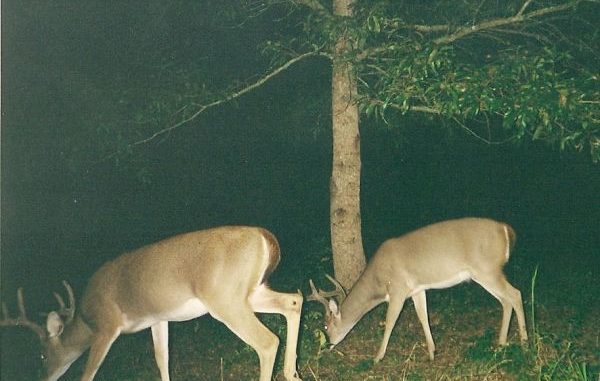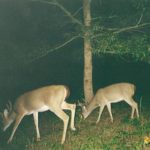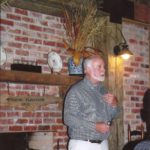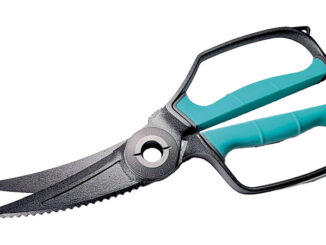
If you didn’t like the 2011 deer season you probably will not like the 2012 season.
My wife and I spent the last week of July on the property at Camp David. It rained one afternoon and around 6 p.m. I made a round looking for the wild and elusive feral hog. I had killed five already and was looking for more pork for the freezer, but they did not want to come out and play. I deliberately walked the edge of a new plot I had planted with some late peas, sunflowers and sorghum looking for tracks but found none.
The next morning I was up early making the round again. I headed straight to the newly planted plot, and sure enough a deer had walked the edge of it and then headed into the strip of cowpeas. Just like the 2011 season, they were only coming out at night, but heck, the season hasn’t even started.
I crossed the creek and was heading toward the first hog bait site and noticed a porker had rooted all around the big water oak tree, no doubt searching for that last acorn. This tree was absolutely loaded with acorns last fall and you could not walk around without stepping on dozens of acorns.
Did the deer and hogs come out during the season and eat them? No, they waited until the season had ended, and then started working on them and now they have finally gleaned them all.
The tree again has an abundant acorn crop, as do most of the oaks that I have been looking at. The mast crop again appears to be very abundant, and hunters who spend their time at the feeders and food plots may be whining again about the lack of deer in the woods
A new season is starting, but the game is the same and the critters have the advantage unless you change it up.
The numbers from the Deer Program at LDWF again report a reduced deer harvest for 2011, less than 2010 and much less 2009.
The blame is being placed on low hunter reporting of harvested deer and low deer populations across the state due to drought, coyotes, hogs and habitat; other factors that must be considered include the tremendous mast crop in 2011 that kept deer movement to the bare minimum. Hunters who spent all their time at feeders and food plots just did not see deer.
Another factor that I believe must be considered is the fact that many hunters have stopped shooting deer. When DMAP began statewide in 1981 the baby boomer hunters were in their 30s and shooting deer was the thing to do. Now the boomers are turning 60, and shooting deer no longer interests them.
Oh, if it is a really good one they might pull the trigger, but for the most part their interest in killing a lot of deer has declined. It appears to me that the next generation of hunters can take it or leave it, and they are not interested in killing a lot of deer, either. I think the days of high deer harvests are over simply because of the hunter element.
The decline in hunter numbers has raised flags all across the country, and many organizations are working hard to generate interest in this next generation, which is certainly the key to keeping the sport of hunting alive and well.
One organization which worked hard to keep the sport of hunting alive and well in the state was the Bayou State Bowhunters Association. This organization did much to promote hunting and sound deer management, but a lack of interest resulted in this organization to disband. For 21 years this association was the voice of the bowhunter across the state, and I commend the good work they did. Many thanks to Harold and Nita Barnette, Russell and Dot Lantier, Mike Colvin and Shane Crochet for the help they gave me.
The Quality Deer Management Association is an organization that is still alive and well in this state and working hard to promote deer management and deer hunting. The founding father of this organization, Joe Hamilton of South Carolina, made a recent trip to the Bayou State to promote the organization and to seek donations for the organization.
If you are not familiar with this organization, let me say that it is not about growing trophy bucks: It is an organization dedicated to sound deer management, with heavy emphasis on habitat management, as well as herd management.
Herd management involves monitoring the herd and managing hunters with the goal of producing a herd in balance with the habitat and a good population of adult bucks.
The organization has a REACH Program (which stands for
Research, Educate, Advocate, Certify and Hunt). It publishes one of the best deer management magazines in the country. While the economics of this country is down and people are cutting back, the organization is working hard to take the association to a higher level and reach this next generation of hunters who are so important to our sport.
The Rack Pack is a new program directed to the generation of young hunters. I would encourage you to check out the association at QDMA.com.
I don’t think Joe left the state with very many donations or commitments to the association. I spoke with him on the phone one day, and told him that Louisiana deer hunters are not well known for supporting deer hunting and management with their money.
Deer are everywhere, and it seems that deer hunters do not see a need to contribute to the cause like the duck hunters or the turkey hunters. Deer hunters are spending money on their own lands or leases, and have never really supported deer programs or organizations at the state or national level. They are satisfied with what they have and, unless there is a specific need for them, they tend not to get involved — especially when it comes to donating money.
I hope I am wrong about this, but just try having a fundraiser for deer management and hunting and I think you will see why Joe came up empty.
If we are going to maintain our rich hunting culture and heritage in this state, the issues that caused the BSBA to dissolve must be addressed or else all the hunting sports will follow this trend.
Money donated for deer management, research and education benefits a lot more than just deer. For a long time the hunters have carried the ball as far as giving for all wildlife and wildlife habitat. We cannot stop now; there is too much at stake.
If you want Joe to know you do care give him a call at 800-209-3337.
I hope you have a successful 2012 deer season, but unless you hunt where the deer are, you may come up empty handed. Change can be good, so try doing something different than what you did in 2011 if you failed to tag a deer.
If you do meet with success don’t forget to report the kill and let LDWF have as much information as possible so they can properly manage our deer herds and give you as much hunting opportunity as possible.




